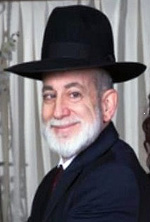Vaerah – Obstacle or Opportunity? You Decide!
By Rabbi Yaakov Marks

SAN DIEGO — When Moshe originally spoke to the Jewish people about G-d’s plan to redeem them, Moshe performed the signs G-d had given him, people, upon witnessing the signs, were convinced that G-d had, indeed, sent Moshe to redeem them. They enthusiastically bowed down to G-d to express their absolute belief that they would now be freed and that they comprehended that G-d had remembered them. When Pharaoh heard that his slaves were rejoicing about Moshe’s news of freedom, he imposed very harsh work orders against them in order to break their spirit. Straw would no longer be supplied to the slaves, but all straw would now have to be collected by the slaves themselves. In addition, they were still expected to complete the same daily quota of brick production.
After a discussion with G-d, Moshe returned to continue his discussion with the Jewish people. However, when Moshe tried to discuss G-d’s plan of freedom with them, he found his words now falling on deaf ears. Many translate the Torah to say, “…but they did not heed Moshe because of shortness of breath and hard work.” Their tremendous belief did not change, it was only that they were short of breath and overwhelmed by hard work. What happened to their dream of freedom and nationhood? Haven’t we seen throughout history situations where individuals and entire nations were able to overcome the worst of conditions in order to fulfill their dreams? So what happened to the dreams of these over worked slaves?
The Malbim (Rabbi Meir Leibush Wisser (1809 – 1879), a rabbi, master of Hebrew grammar, and Bible commentator, offers a profound and empowering interpretation (Exodus 6;9). He interprets “Ruach” as the inner spirit. A person can have an “enduring spirit” or a “short spirit”. The “enduring spirit” enables a person to hold back emotions and withstand any pain and suffering in pursuit of his dream. The present pain is dwarfed by the awesomeness of the dream. The “short spirit” is the opposite: the person wants immediate results and becomes frustrated when things don’t go the way he had planned. The focus on the present pain blinds him from seeing the beauty of his dream. If a person is one of “short spirit” and everything is going the way he wants it to, he will be fine. As soon as he encounters some difficulties, however, he will give up. The Malbim explains that this happened to the Jewish people in Egypt. When Moshe first spoke to them, they were excited about their freedom and nationhood. When Moshe returned, things had changed. Their dream of freedom and nationhood had not changed, but the hard work had overwhelmed them. The Malbim says the hard work triggered their short spirit, causing them to give up. They were no longer able to listen to Moshe because things didn’t go the way they had planned. “They didn’t listen to Moshe because of their short spirit and from the hard work.” The hard work was really something G-d needed to do to help and strengthen them, but the people understood the hard work to be a negative rather than a positive contributor toward fulfilling their dream.
May we merit to have an “enduring spirit” to pursue our dreams. May we blessed with the strength to turn the boulders and even landslides that we think G-d is putting in our way as obstacles into tools for us to use to climb even higher towards the fulfillment of our potential in life.
*
Rabbi Marks is a certified health coach who may be contacted
ahealthyrabbi@gmail.com